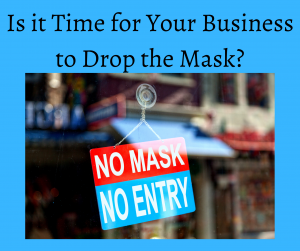After a year of employee and customer mask requirements being a no-brainer for small businesses, the CDC’s recent change in guidance that those who have become fully vaccinated against COVID-19 need not wear masks in many public settings has required business owners to put on their thinking caps again with regard to this issue, for the first time in more than a year.
Major retailers like Costco, Kroger, Walmart, Target, Walgreens and CVS have revised their guidance to match that of the CDC, although individual store locations in more highly populated areas like Chicagoland have not necessarily followed suit.
Most are asking employees whether they are vaccinated, but businesses are not asking customers and other visitors to show their vaccination cards to prove they have gotten both doses (or the one-and-done dose of Johnson & Johnson). But what should your small business do?
The CDC’s guidance handed down May 13 defers to state and local governments to set stricter guidelines if they so choose. The State of Illinois has chosen to follow the CDC’s guidance, but the City of Chicago is adopting more of a wait-and-see approach, and the regulations might vary among suburban municipalities and counties, at least for a little while. (See: https://www.chicagotribune.com/coronavirus/ct-coronavirus-illinois-mask-mandate-20210517-3wulwtdeo5ejtoev3sbh5icovq-story.html.)
Once you have figured out what local regulations do or don’t apply to your business, it’s time to consider whether to require that your employees prove they have been vaccinated, or turn to the honor system. If you don’t require proof, it’s possible that the federal OSHA will slap you with a general duty clause citation. The CDC’s pronouncement does not clarify this one way or the other.
Another cloudy aspect of this matter is that many states and local governments have banned companies from requiring proof of vaccinations, although most don’t necessarily include employees as being covered by that ban. Whether an employer can require employees to get the COVID-19 vaccine is a complicated issue and there is no clear answer to whether an employer can require employees to get the COVID-19 vaccine. There is currently nothing to prohibit employers from requiring employees to receive the vaccine. Buit, if a person cannot get the vaccine due to an approved ADA medical condition/disability, they are protected under the Americans with Disabilities Act and must be provided reasonable accommodation to continue to work. If a person has a religious objection, they will also have to be provided accommodation. There is no federal law prohibiting an employer from requiring the vaccine.
In Illinois there is a bill introduced by Illinois House Republicans prohibiting employers from requiring proof of the COVID-19 vaccine. The proposed legislation (HB3682) would make it illegal for an employer in Illinois to require an employee to show proof of receiving a vaccine that is only approved for emergency use authorization by the Food and Drug Administration (FDA) — in other words, the COVID-19 vaccine.
All of this can be quite challenging for employers to manage, especially if they have stores or other operations in more than one state. One hopes that OSHA will address these issues directly in the near future so employers will know how to remain in compliance.
Until then, the best that employers can do is to get up to speed on local and state requirements, follow those dictates, and consider whether it’s necessarily time to allow vaccinated employees to remove masks, whatever the CDC might have to say about it in general.
Some might choose to wait a few weeks or a month for the great unmasking to begin, even for the fully vaccinated. And decisions may differ about whether to require verification of vaccinations. Welcome to what some are calling the “interim period” of the COVID-19 pandemic, with a slow winding down—but not complete stoppage—of the habits we’ve all gotten to know so well, for better or for worse. Before your business decides to adopt a mandatory vaccinati0n policy, employers should consult with experienced business lawyers.
 Chicago Business Attorney Blog
Chicago Business Attorney Blog


